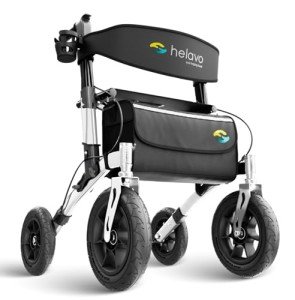Could Lightweight Walker Be The Answer To 2024's Resolving?

The Essential Guide to Lightweight Walkers: A Comprehensive Overview
As life goes on, mobility can typically end up being minimal for various factors, such as age, injury, or health conditions. For numerous individuals, having the right mobility aid is necessary for keeping self-reliance and confidence while moving about. Among the most popular choices offered on the marketplace today is the lightweight walker. In this post, we will dive deep into the world of lightweight walkers, exploring their features, benefits, and considerations for selecting the right one.
What is a Lightweight Walker?
A lightweight walker is a kind of mobility aid created to support individuals who require assistance with walking however require a solution that doesn't problem them with extreme weight. These walkers are generally made from durable yet lightweight products such as aluminum, making them easy to raise and maneuver. Heavy-Duty Rollator Walker can significantly boost mobility and promote a sense of independence for users.
Features of Lightweight Walkers
Picking the best lightweight walker involves comprehending the numerous features they offer. The following table describes some typical features and specifications to look for when picking the ideal walker:
| Feature | Description |
|---|---|
| Product | Frequently made from aluminum or other lightweight products for easy mobility. |
| Weight Capacity | Normally supports in between 250-350 pounds, but this varies by design. |
| Foldable Design | Many lightweight walkers featured a foldable function for easy transport and storage. |
| Height Adjustability | Users can customize the height to ensure comfort and proper posture. |
| Hand Grips | Ergonomic handgrips supply included convenience and security while walking. |
| Wheels | Some designs consist of rubberized wheels for smoother mobility, while others are created without them for a stronger base. |
| Accessories | Alternatives for baskets, trays, or other add-ons to enhance performance. |
Benefits of Using a Lightweight Walker
Lightweight walkers provide lots of advantages, making them a perfect alternative for those requiring mobility assistance. Here are some considerable advantages:
- Enhanced Mobility: Lightweight walkers allow users to navigate through areas with ease, promoting independence.
- Easy to Carry: Their lightweight design enables users to raise and transport them without difficulty.
- Stability and Support: Walkers offer a stable base for users, making walking much safer and decreasing the risk of falls.
- Enhanced Posture: The adjustable height function assists users keep proper posture while walking, contributing to long-lasting health.
- Customizable Features: Many designs offer a variety of devices that can be tailored to fit individual requirements.
- Cost: Compared to other mobility aids, lightweight walkers are typically more budget-friendly without compromising quality.
Factors to consider When Choosing a Lightweight Walker
Choosing the ideal lightweight walker involves thinking about various factors that line up with specific requirements. The following list uses crucial elements to examine:
- User's Weight and Height: Ensure the walker can accommodate the user's weight and can be changed for height.
- Surface: Consider where the walker will primarily be utilized (indoor, outdoor, smooth surface areas, irregular terrain).
- Practical Needs: Think about any specific requirements such as walking speed, frequency of usage, and wanted features (like baskets or removable seats).
- Portability: Determine whether the walker requires to be quickly portable for getaways or journeys.
- Type of Walker: Decide in between basic, wheeled, or rollator walkers based on the user's balance and walking capability.
Frequently Asked Questions (FAQ)
1. Who should use a lightweight walker?
Lightweight walkers are perfect for elderly people, those recuperating from injury, or anybody who requires extra support while walking.
2. Just how much do lightweight walkers normally cost?
Prices can differ based on features and brand name. Lightweight walkers can vary from ₤ 50 to ₤ 250, with more advanced designs costing more.
3. Are there walkers particularly designed for outdoor use?
Yes! Some lightweight walkers featured larger wheels and more durable building and construction, making them appropriate for outdoor terrain.
4. How do I understand which height is proper for the walker?
When utilizing a walker, the user must change the handgrips to elbow level when their arms are unwinded at their sides, preserving a slight bend in the elbows.
5. How typically should you inspect a lightweight walker?
It's excellent practice to check the walker for wear and tear frequently. Try to find any loose parts, used grips, or harmed wheels, especially if utilized daily.
In summary, a lightweight walker works as an invaluable tool for individuals in requirement of mobility assistance. Its combination of ease-of-use, security, and customization allows users to with confidence engage with their surroundings while preserving independence and individual mobility. When selecting the best walker, it's important to think about the user's private needs, preferred features, and intended usage.
With numerous designs offered in today's market, prospective users can find the perfect lightweight walker that will not only boost their mobility but likewise enhance their total lifestyle. After all, everybody deserves the liberty to move with self-confidence and ease.

